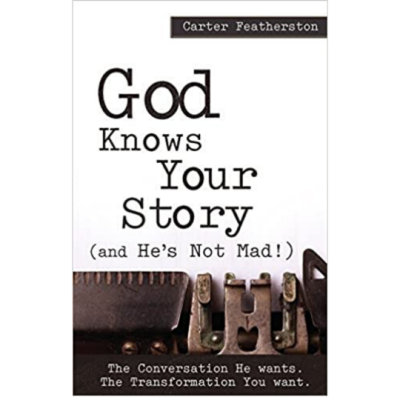Thank you for visiting. We trust that you have enjoyed reading our articles.

Book Review: God Knows Your Story (And He’s Not Mad!) by Carter Featherston
“For your goodness and love pursue me all the days of my life” (Psalm 23:6 TPT).
If you have never done anything wrong and do not have any regrets or shame, then this book is not for you. However, I strongly suspect that all of us have regrets and feel some sense of shame for poor choices. This is a Biblically based book that points the reader to the only true source of victory of sin and shame, Jesus.
This book is valuable because it addresses a topic that all struggle with but is seldom discussed. I have known Carter for several years through his talks at various Iron Sharpens Iron conferences, which are always well attended and well received. Carter is the perfect messenger because of his deep knowledge of Scripture from his years in seminary and as a pastor. The book is also beneficial because it is authentic. At the end of Chapter one, Carter writes, “My qualifications to write this book are twofold: I have outrageously failed in life as my story finally defeated me; but I cried out to God, Who answered me and showed me great and hidden things I did not know (Jeremiah 33:3). This book is about what I learned on that journey.”
The first six chapters are categorized as Dialogue: God’s Plan For Transformation. The first chapter is entitled, Our Stories Begin With Hiding. Just as Adam and Eve covered their shame with fig leaves we and often cover ourselves with a “false self “to cover our shame. The book proceeds with authentic examples from Carter’s life and Scripture to help the reader find freedom.
Carter unpacks Ephesians Chapter 1 to explain six comforting and encourage elements about our relationship with God. We (1) were chosen, (2) are holy and blameless, (3) have been adopted, (4) have redemption, (5) were granted forgiveness, and (6) were sealed with the Holy Spirit.
The final seven chapters are categorized as Strategies: Changing at the Level of Identity. Carter takes the reader on a deep dive to change how we perceive ourselves by understanding who we are and Whose we are. Carter shepherds the reader along the path of God’s grace, God’s Word, and prayer to facilitate a change at the level of identity.
I underlined several sentences and paragraphs in the book. One that particularly resonated with me was, “Every passage in the New Testament about our identity is taught to us personally and privately by the Holy Spirit. If He does not teach us, it will remain as mere words on the page. Now that will preach!
Carter (and all of us) are not defined by our past mistakes. Carter beautifully reveals how He has obtained true and lasting forgiveness for his sins from Jesus and we can too. By yoking up to Jesus, Carter’s past failings are now being used as a powerful, authentic witness to help others. As I read the book my mind would often drift to Luke 4:18 where Jesus reads from the scroll of the Prophet Isaiah and announces, “He has sent me to proclaim freedom for the prisoners and recovery of sight for the blind, to set the oppressed free.” I now realize how some people have imprisoned themselves due to shame, have vision but are blind to the promises of love from the Father in Scripture, and are oppressed by a self-created monster of shame due to an inability for self-forgiveness. The book is available at Amazon and will be a blessing to yourself or as a gift to a friend.
Prayer: Dear God, We all have sinned and fall short of Your glory. Open our ears to hear Your voice. Open our eyes to see ourselves as You see us. Help us to claim our new identity in Christ. Amen.
Meet the Author
Todd Shupe is a Men’s Ministry Specialist through the General Commission of United Methodist Men and is in training to be a Certified Lay Minister through the Louisiana Conference of the United Methodist Church. He currently serves as the President of the Baton Rouge District of United Methodist Men and is a Board Member for Gulf South Men and serves on the Action Team for The Kingdom Group. He is a volunteer for the Walk to Emmaus, Grace Camp, and Iron Sharpens Iron. Todd resides in Baton Rouge, Louisiana.
We welcome your comments below.
Liked this post?
Read more below or search for more topics...
-
The Unforgivable Sin?
The Unforgivable Sin? “But the father said to his servants, ‘Quick! Bring the best robe and put it on him. Put a ring on his finger and sandals on his feet. Bring the fattened calf and kill it. Let’s have a feast and celebrate. For this son of mine was dead and is alive again; he was lost and is found.’ So they began to celebrate” (Luke 15:22-24 NIV). Years ago a dear friend, let’s call him John, confided in me that he had made the “unforgivable sin.” I was expecting him to tell me about how he had committed blasphemy against the Holy... -
The Holy Covenant of Marriage Part 3: Submission and Leadership
The Holy Covenant of Marriage Part 3: Submission and Leadership “Now as the church submits to Christ, so also wives should submit to their husbands in everything” (Ephesians 5:24 NIV). Perhaps no other Scripture is more misunderstood than the concept of submission in marriage. Although there is much Scripture regarding marital roles, perhaps none is cited more than Ephesians 5. It should be noted that the first directive for submission is for general submission to each other. “Submit to one another out of reverence for Christ” (Ephesians 5:21). This submission is in deference to the ultimate leadership of the husband for the health and harmonious... -
Loneliness: There’s A Time To Give And Time To Receive
Loneliness: There’s A Time To Give And Time To Receive “May the LORD our God be with us as He was with our ancestors; may He never leave us or abandon us” (1 Kings 8:57 NLT). Loneliness can be a problem for nearly everyone at some point. It is particularly problematic with widows, orphans and incarcerated individuals. Good friendships can reverse feelings of loneliness. We all yearn for a “wind beneath our wings,” to quote from a Bette Midler song. We must realize that that wind already exists. Ezekiel 37:1-14 and “The Valley of Dry Bones” is a great story. Ezekiel was...



